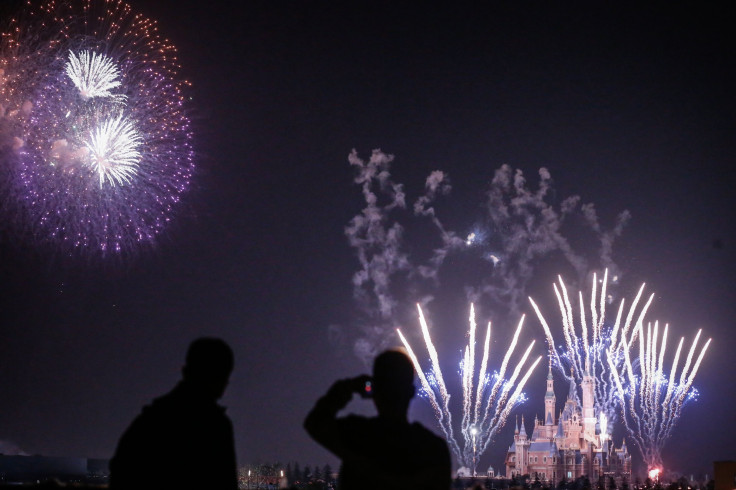Mickey Mouse Mooncakes And Pork Knuckles, Minnie Mouse Red Bean Buns And Peking Duck Pizza: Shanghai Disneyland Seeks To Please Chinese Diners

SHANGHAI -- As Shanghai Disneyland — the Walt Disney Company’s first theme park in mainland China — prepares for its opening in June, the company has unveiled a menu designed to cater to local tastes, in an apparent effort to avoid the cultural faux pas that have left diners feeling dissatisfied at some other foreign attractions in China.
The resort’s food and beverage director Paul Chandler Wednesday invited Chinese media to see a display of the dishes that will be available in some of the resort’s restaurants, which he said were designed to "respect the Chinese traditional diet."
According to Chinese media reports, the resort’s “Shanghai menu” would feature such delicacies as Mickey Mouse mooncakes (stuffed with meat), Mickey braised pork knuckle, Minnie Mouse Red Bean Buns, and Mickey Peking duck pizza.
Many items would be served on Disney-themed dishes, while in some cases, the food itself would be cut in the shape of the cartoon rodents’ distinctive silhouettes, as in the case of the pizza, and the pork knuckle, which would be served on a bed of Shanghai cabbage. Beijing-style stewed lamb, meanwhile, would be accompanied by Mickey-shaped carrots.
And with Disney predicting that the resort will attract visitors from all over China, Chandler said it would feature all of China’s eight major regional cuisines, including Sichuan, Hunan, Shandong and Cantonese. To this end, it has hired chefs from around China, some of whom would demonstrate their skills in front of visitors, a feature that would, according to the resort’s “Guiding Principles,” ensure “a holistic guest sensory dining experience.”
Western food will also be available in a number of restaurants when the resort opens on June 16 — and other dishes include the not-so-Chinese Donald Duck waffle. But the resort is clearly keen to avoid the complaints that have sometimes plagued foreign-invested attractions in China that there is not sufficient Chinese food on offer to cater to local tastes.
IKEA’s China stores, for example, now sell a selection of Chinese dishes with rice, as well as Swedish meatballs, while KFC has launched a range of localized dishes under the slogan “Changing for China," including “Old Beijing chicken wraps” and hot and sour soup. McDonald's has also introduced a number of dishes featuring chicken, which many Chinese diners prefer to beef.
Disney has also emphasized that the resort will include other “distinctively Chinese” elements. Its "Enchanted Storybook Castle" -- the largest of those in any of its parks -- is dedicated to all Disney princesses, including Mulan, the eponymous heroine of the film about a female warrior based on a traditional Chinese story. There will also be an area dedicated to the Chinese Zodiac, with each of the twelve traditional animal symbols represented by a cartoon character, as well as a Wandering Moon Teahouse, inspired by Chinese “wandering poets," and a Fantasia Carousel designed by Chinese artists, the company has said.
The resort's East-meets-West fusion will include plenty of other elements, including a "Pirates of the Caribbean"-themed Treasure Cove, a Tron lightcycle rollercoaster, a "Toy Story" hotel, and a theater with performances of the "Lion King" in Chinese. But its local flavor has been emphasized by Disney’s recent naming of three Chinese celebrities — ex-NBA star Yao Ming, pianist Lang Lang and actress Sun Li — as honorary ambassadors.
The Walt Disney Company has bet big on success in the Chinese market, with its 43 percent in the $5.4 billion resort, a joint venture with a Shanghai government-backed group, reported to be its largest overseas investment. And despite delays in construction and opening, there have been signs of enthusiasm among China’s cartoon loving youth — as demonstrated by the recent success of Disney movies like "Zootopia" (though the Chinese army newspaper criticized it for distorted values ) — and the "Jungle Book."
The Shanghai Disney Resort’s website briefly crashed due to demand when tickets went on sale late last month, while its hotels are reportedly fully booked for the opening two weeks. Scalpers have been offering tickets for opening day for up to $600, compared to the official price of around 500 yuan (some $77) according to Chinese media.
Some experts say it could attract 11.5 million visitors in first year, and as many as three times this figure annually in the longer term, with annual revenue estimated at between 24 billion yuan ($3.7 billion) and 40 billion yuan (around $6.2 billion) a year.
However, it could well hit Hong Kong Disneyland, which made a loss last year for the first time since 2011, as visits by mainland Chinese citizens fell.
© Copyright IBTimes 2024. All rights reserved.






















